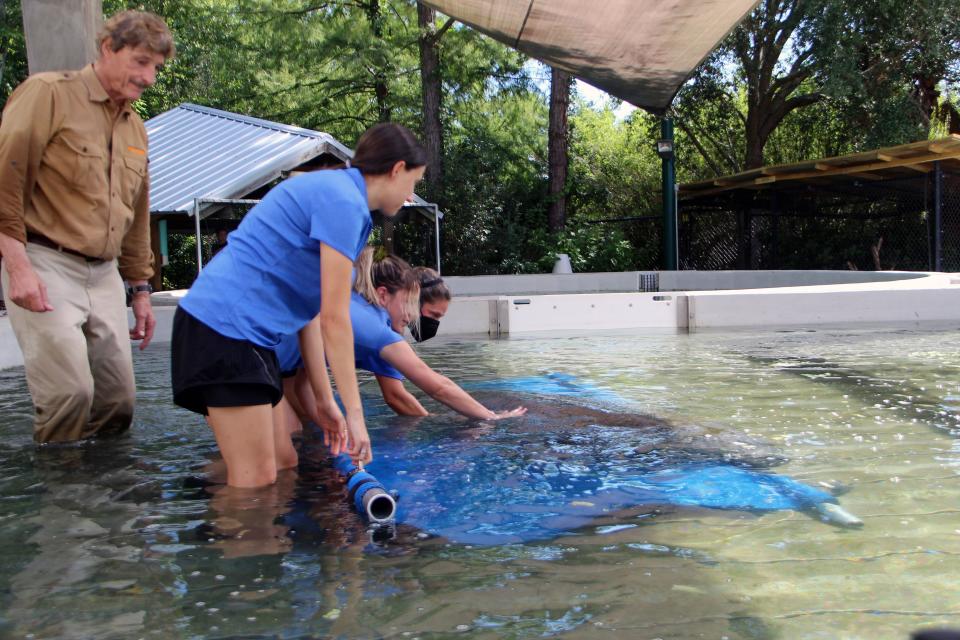Mutual of Omaha’s Wild Kingdom films an episode at the Jacksonville Zoo and Gardens
The Jacksonville Zoo and Gardens Manatee Critical Care Center will be featured on Mutual of Omaha’s Wild Kingdom’s new series, “Wild Kingdom Protecting the Wild.” Television host and conservationist Peter Gros will showcase the Zoo’s Manatee Critical Care Center, Northeast Florida’s first-ever manatee acute care and rehabilitation facility which provides life-saving medical treatment to rescued manatees.
The show will be among ten episodes making their debut in January on RFD-TV and digital channels in conjunction with Mutual of Omaha’s Wild Kingdom 60th anniversary.
Since opening in 2017, the Manatee Critical Care Center’s is the Zoo’s largest regional conservation initiative. The Manatee Rescue and Rehabilitation Marine Mammal Response Team is composed of Zoo staff members who assist the Florida Fish and Wildlife Conservation Commission with rescuing and transporting injured the marine mammals to rehabilitation centers in Florida, including its own. Once recovered, the mammals are released back into the wild.
Craig Miller, Curator of Mammals at the Jacksonville Zoo and Gardens, and his team provide acute care to manatees who have been dying of starvation at a alarming rate due to a lack of sea grass in Florida’s waters. Experts are blaming algae blooms for the severe loss of the manatees primary food.
“Our goal is to get the Manatee’s rehabbed and released as soon as possible,” said Miller. “Anyone can visit our website to find ways to support these mammals. I also encourage people to get out into the wild to see the manatees. I believe it will encourage them to continue to take care of them.”
Miller stressed the responsibility of the role that we - humans - play in conserving all of nature’s plants and animals. We can and should take heed to a variety of simple ways to cohabit with these underwater giants.
Underscoring the importance of keeping all waterways clean, Miller described manatees as curious animals who will venture into eating almost anything; causing these gentle animals to ingest garbage which causes the mammal to become dangerously impacted.
Miller also explained the importance of following instructions when fertilizing lawns.
“Rain washes everything into streets and retention ponds which eventually ends up in our waterways‚” he said. “The nutrients washed into the waterways causes algae bloom which blocks the sunlight and kills growing seagrass that the manatees eat.”
Miller added the importance of picking up after your dog and making sure that septic tanks aren’t leaking as additional ways to make sure that we - humans - play an active role in sustaining a healthy life for all manatees.
Together with Gros, Miller and his team were filmed taking the temperature of the most gentle male. The mammal was measured and given lots of pets before being placed back into its tank.



























































Since its debut in 1963, Mutual of Omaha says it has remained committed to conserving and protecting the wildest regions known to man. Florida panthers, cougars, bears, wolves, and coral will also be included in the upcoming series.
“We are in the beautiful state of Florida filming multiple episodes for Mutual of Omaha’s Wild Kingdom’s new series celebrating the incredible work being done by many compassionate conservationists,” said Gros. “We’ll hopefully encourage a new generation to commit to making a positive impact on the Wild Kingdom.”
According to Jen Wulf, Vice President of Brand Strategy and Engagement at Mutual of Omaha, Wild Kingdom is proud to collaborate with leading habitat and wildlife conservation organizations, such as the National Wildlife Federation and the Association of Zoos and Aquariums (AZA), to bring greater awareness to specific animal and habitat related issues.
“We are excited to build on the conservation legacy of our original show,” Wulf said. “Our storylines will focus on the good as we celebrate the great work by many caring, compassionate individuals and how they are making a positive impact on the Wild Kingdom.”
Florida filming was made possible by collaborating with the Association of Zoos and Aquariums, Sarasota ‘s Mote Marine Laboratory & Aquarium, the Jacksonville Zoo and Gardens, and The Florida Aquarium in Tampa. Other stops will include the Florida Coral Rescue Center and the Florida Power & Light Company’s Turkey Point Clean Energy Center.
The Florida animals featured in the episodes will include:
American Crocodiles: The American crocodile’s breeding program at Turkey Point Nuclear Clean Energy Center, a clean energy center in South Florida will be on stage. The episode will showcase 11,000 acres of protected land, an ideal habitat for the crocodiles to thrive and nest without the risk of flooding. Last year, more hatchlings were produced than ever before in its 40-year history.
Coral Reefs: To the surprise of many, corals are animals. Coral reefs cover less than one -percent of the ocean floor but support approximately 25% of marine life. Coral reefs are dying worldwide due to increasing water temperatures and ocean acidification caused by climate change and disease. This episode will highlight how local organizations are working to fight reef loss along the Florida coast and how Americas’ AZA-accredited zoos and aquariums are becoming repositories for coral.
Sea Turtles and Manatees – The episode will highlight citizens patrolling Florida’s sea turtle nesting areas and highlight the severe habitat impact red tide has on depleting the manatee food supply.
For additional information about Mutual of Omaha’s Wild Kingdom Protecting the Wild, including the show’s filming schedule and adventures, visit www.wildkingdom.com

